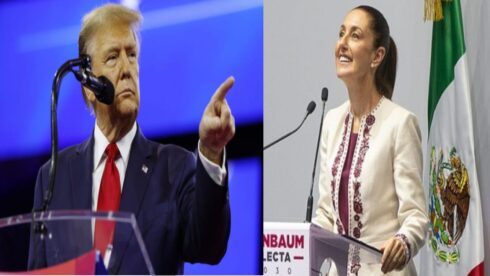Mexican President Claudia Sheinbaum has forcefully rejected former U.S. President Donald Trump’s proposal to classify Mexican drug cartels as terrorist organizations, calling it a dangerous precedent that could justify American military intervention in Mexico. In a firm statement to reporters, Claudia Sheinbaum emphasized that Mexico would not tolerate any external interference under the guise of counterterrorism.
“This cannot be an opportunity for the U.S. to invade our sovereignty,” she stated, reaffirming Mexico’s commitment to bilateral cooperation without yielding to American pressure. Sheinbaum’s stance aligns with the long-held Mexican policy of rejecting foreign intervention, particularly from its northern neighbor.
Elon Musk Stokes Controversy Over Drone Strikes
Amidst the escalating debate, billionaire Elon Musk added fuel to the fire by suggesting that Trump’s classification of cartels as terrorists could make them “eligible for drone strikes.” This remark has raised alarm over the potential use of U.S. military force on Mexican soil, a move that could trigger a diplomatic crisis.
Musk’s comment reflects the growing militaristic rhetoric within certain circles of American politics, where some advocates see direct military action as a solution to cartel violence. However, Claudia Sheinbaum and other Mexican leaders argue that such an approach would only escalate tensions and violate Mexico’s sovereignty.
Mexico Rejects Any Form of Foreign Military Action
Claudia Sheinbaum made it clear that Mexico will not tolerate any foreign-led military operations within its borders, emphasizing that cooperation must be based on mutual respect rather than coercion. “With Mexico, it is collaboration and coordination, never subordination or interventionism, and even less invasion,” she asserted.
Her remarks come as concerns grow over Trump’s potential return to power and the implications of his hardline stance on Mexico. Claudia Sheinbaum’s administration has reaffirmed that while Mexico is committed to tackling organized crime, it will not accept unilateral actions that undermine its independence.
Cartels: Criminal Enterprises, Not Terrorist Groups
Experts and Mexican officials argue that while drug cartels engage in brutal violence, their primary motive is profit rather than ideology. Unlike terrorist organizations that seek political or religious objectives, cartels function as illicit business enterprises driven by the drug trade and extortion.
Labeling them as terrorist organizations, as Trump suggests, could pave the way for extrajudicial military actions that bypass diplomatic protocols. Mexican authorities stress that the solution lies in addressing drug demand in the U.S. and strengthening bilateral efforts to combat organized crime, rather than resorting to aggressive military measures.
Trump’s Agenda: Appeasing MAGA and the Military-Industrial Complex
Trump’s rhetoric on Mexico has long been fueled by nationalist and anti-immigrant sentiments, making the proposed terrorist designation a strategic move to appease his hardline supporters. His stance plays into the fears of his base while also benefiting the military-industrial complex, which stands to gain from increased defense spending and potential military operations.
By framing the cartels as a national security threat, Trump can justify aggressive policies that prioritize military action over diplomatic solutions. Claudia Sheinbaum, however, has made it clear that Mexico will not be bullied into submission, reinforcing her commitment to sovereignty and strategic cooperation rather than confrontation.
The Threat of Unilateral Action and Diplomatic Fallout
Claudia Sheinbaum’s firm rejection of American intervention raises concerns over how a Trump presidency could escalate tensions between the two nations. If Trump were to act unilaterally, deploying drone strikes or military forces without Mexico’s consent, it would likely be seen as an act of aggression—a potential precursor to a broader diplomatic crisis.
With U.S.-Mexico relations already strained over immigration and trade, any military escalation could severely damage diplomatic ties. Claudia Sheinbaum’s strong opposition underscores the risks of Trump’s proposal and highlights Mexico’s resolve in defending its sovereignty against external threats.














